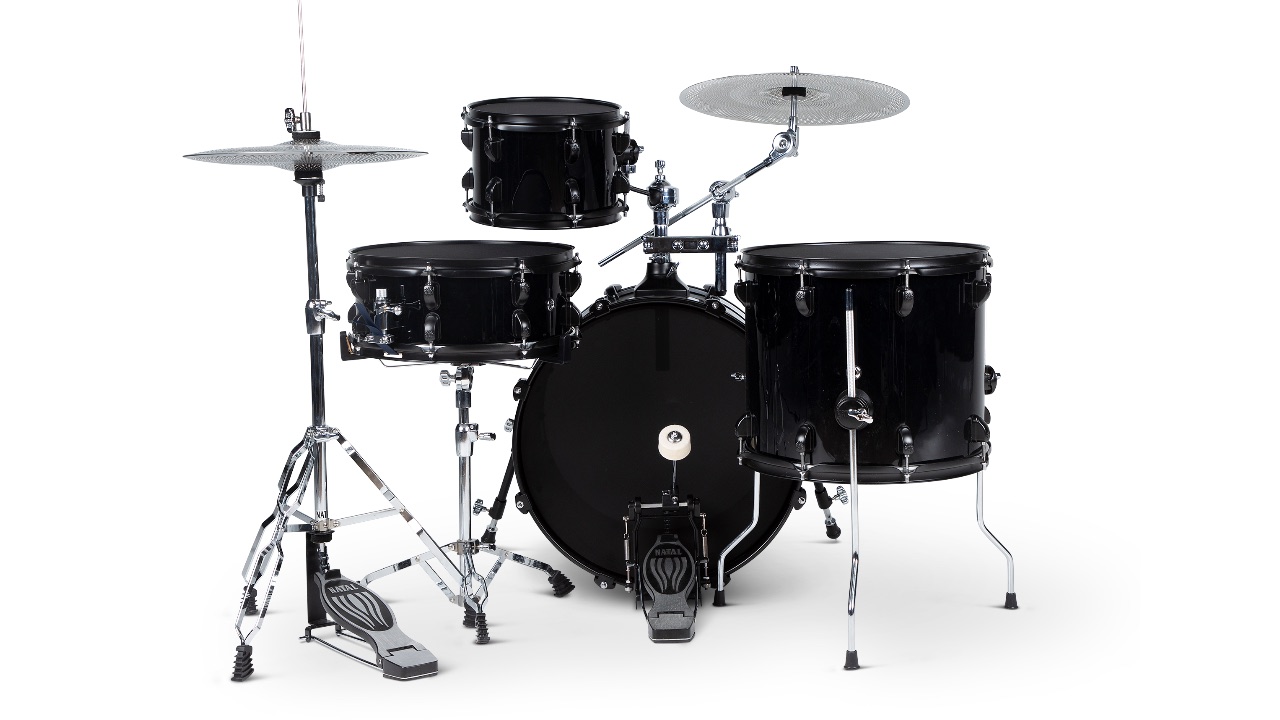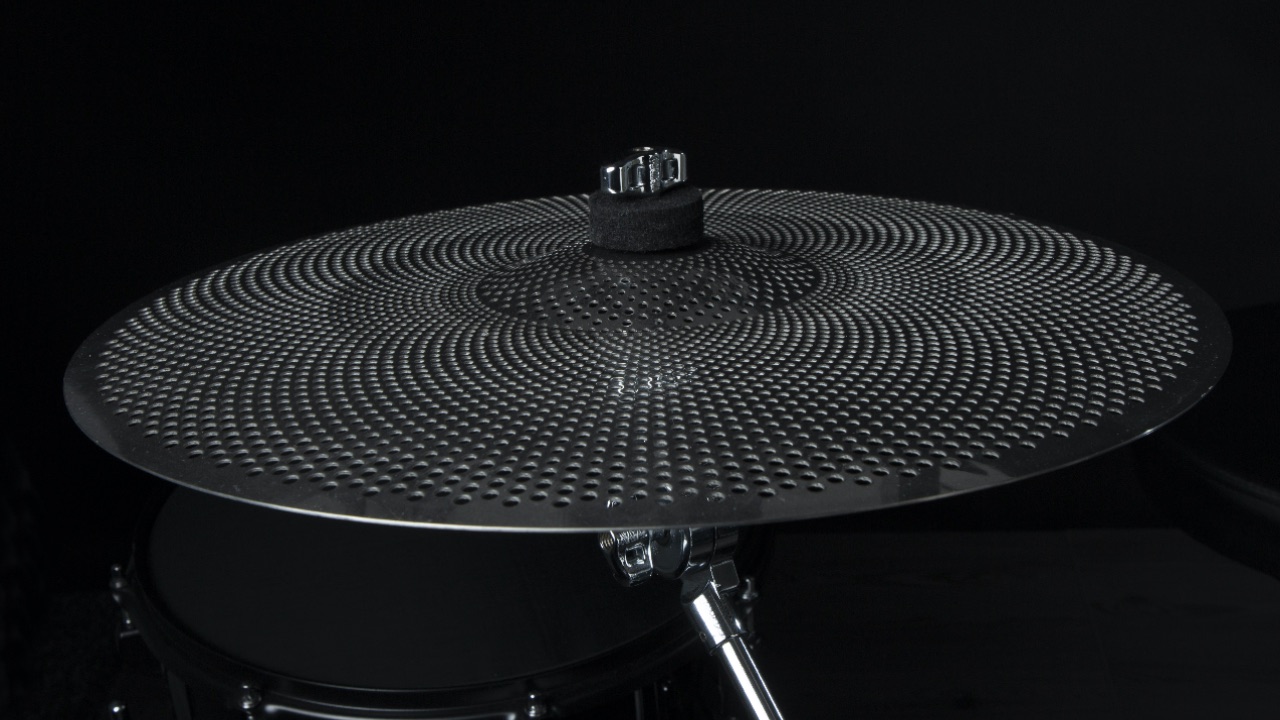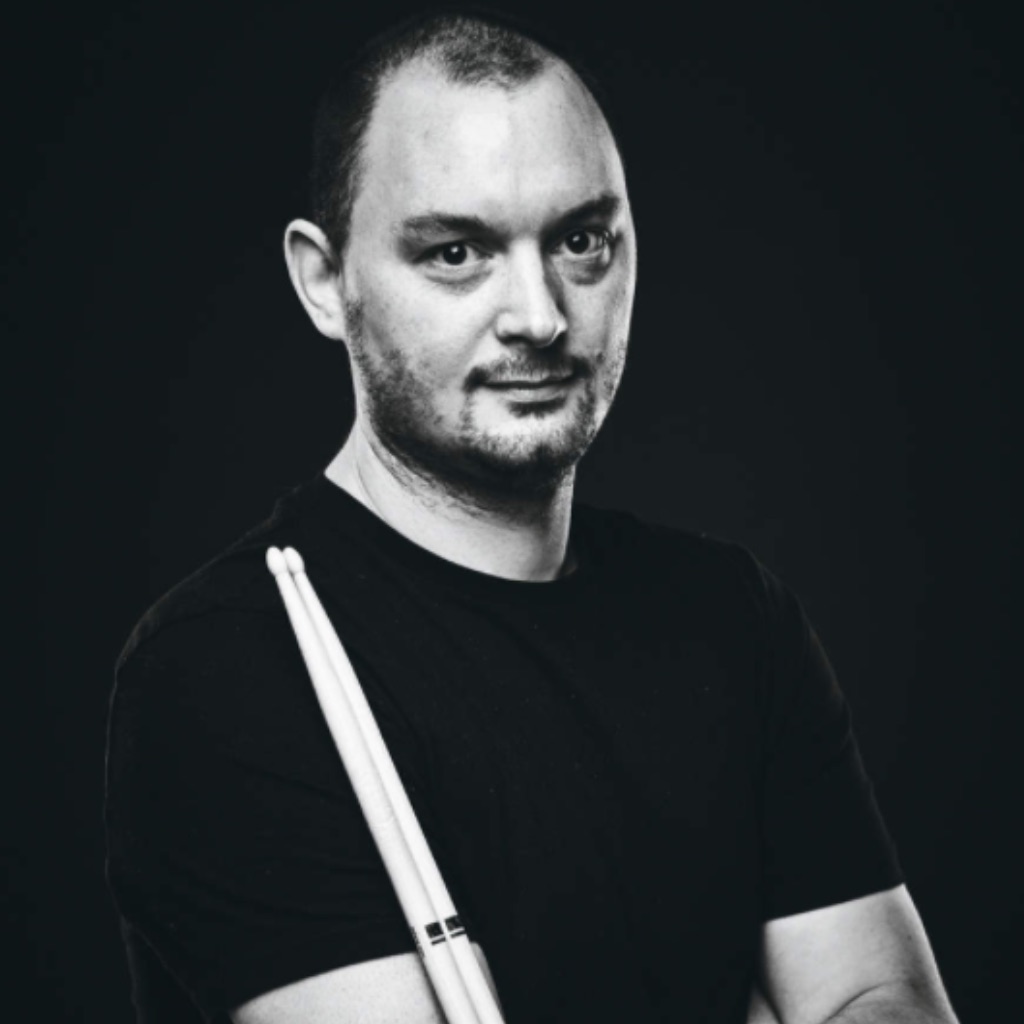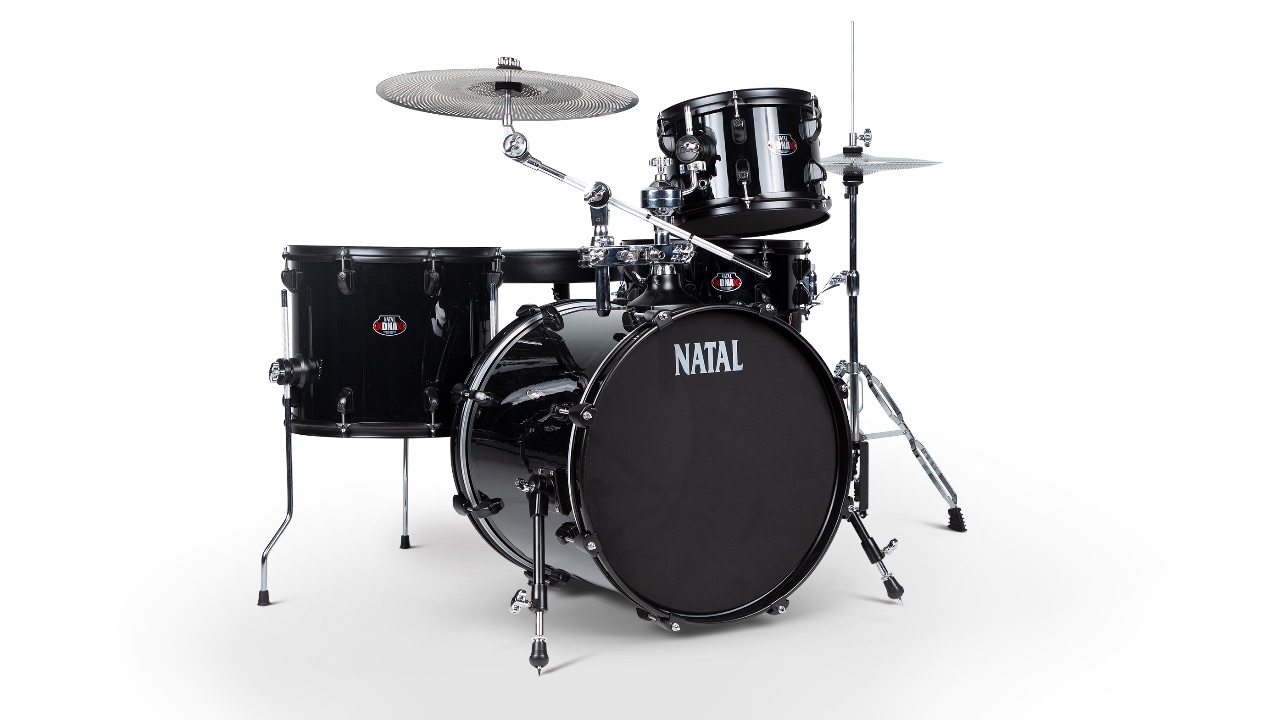MusicRadar Verdict
At its most simple, this is a solution that we think will be hugely popular as a quiet kit for playing at home. But moreover it will get the imaginations of drummers ticking.
Pros
- +
Medium-sized solution for noise-free drumming at home
Cons
- -
Converting it for louder use is slightly tedious
MusicRadar's got your back
What is it?
Setting up an acoustic kit at home is an exciting moment for any drummer, but sadly it’s often quickly followed by complaints and the arrival of any number of noise-killing products. Electronic drum sets are a great solution, and one that people are increasingly turning to with great success, but to purchase an e-kit that replicates the form factor of an acoustic kit is still prohibitively expensive for many.
Natal’s DNA Stealth is a more traditional acoustic setup, but it comes with a twist - its volume has been dramatically decreased straight out of the box thanks to factory-fitted mesh heads and the inclusion of a set of Natal-branded practice cymbals.
First off, we should point out that what we have here is fundamentally a bop-sized (18”x16” bass drum, 10”x7” rack tom, 14”x12” floor tom and a 13”x5.5” snare) acoustic drum kit. If you’ve ever looked into the cost of outfitting an acoustic kit with premium mesh heads such as Remo Silent Stroke range, you’ll know that the price adds up.
So, what Natal has done here is cut out the legwork for you. Rather than selling you an affordable acoustic kit that you later adapt for quieter home use, the Marshall-owned drum brand has simply turned the whole process on its er…head, and supplied the DNA Stealth with everything you need to be quieter from the off.
There’s mesh heads on both sides of every drum, practice cymbals that are a lot quieter than traditional models, and all the hardware required to place each part of the kit. There’s even a stool, sticks and drum key included in the setup so you really can get going straight away. It’s a straightforward idea - after all you can do this to any drum kit - but it’s one that that has us thinking ‘Why has nobody else done this yet?’.
Of course, this being a traditional, wooden shelled drum kit at heart, the mesh heads can be removed and replaced with regular drum heads in exactly the same way as any other drum. So Natal is positioning the DNA Stealth as a dual-purpose setup: Mesh heads and quiet cymbals at home, a quick swap and off to the gig/band practice as-and-when you need to be heard.
With that in mind, Natal is clearly aiming this at everyone from beginners and more established drummers who need the option of playing a traditional-feeling setup at home. Let’s dig a little deeper, and fear not: this won’t get loud.

Performance and verdict
The DNA Stealth is supplied in one size configuration (as mentioned above) with the idea being that you can fit this kit into a corner, spare room, garage etc with ease. It also means that it is suitable-sized kit for smaller and taller players alike. It’s affordable too, with the whole lot ringing-up a full list price of £399, plus Natal is offering a snare-only pack with the drum, snare stand, case and sticks for £99.
To keep things simple, it’s offered in any finish you like as long as it’s Gloss Black, which we can see being an inoffensive, everybody’s-sort-of-happy solution. The shells are made of basswood, with matching black triple-flanged rims and lugs.
You get all the stands you’ll need too, and while it’s of the basic/beginner variety, it is well made and feel sturdy enough that it’ll last a good while without constant setting up/down. The included crash/ride cymbal is attached to the bass drum-mounted tom post with a multi-clamp and boom arm that’s easily positioned and further saves on floor space.
The kit arrived with us in two boxes, a larger one containing the majority of the drum shells, hardware, heads and cymbals, plus an additional carton with the floor tom. The snare and floor tom comes fully assembled, but you’ll need to attach the heads to the rest of the kit.

Then there’s the practice cymbals. You get a pair of 14” hi-hats and a 16” ride, and if you’ve never experienced cymbals of this kind before then you’re in for a slightly surreal treat. They’re perforated with holes across the entire playing surface, following a similar concept to mesh heads in order to keep the volume down.
Assembling the kit took us about 45 minutes as we hurriedly got busy with a bag of tension rods and the included mesh heads. It’s worth noting that you’ll need some knowledge of how to put a kit together, but that’s no different to buying any other kit. Once you’re up and running you’ll notice two things immediately: quiet cymbals really do work, and the snare drum is very impressive.
You can tune the mesh heads to achieve the sort of tension and response you’re looking for, with the top head giving you a change in stick rebound and feel. By experimenting with the tension of the snare-side head and the snares themselves via the strainer, it’s possible to change the amount of snap and duration of each note a bit.
It can also affect the attack of the note too, with the snares looser and less tension on the bottom head you’ll get a softer sound, which adds to the low-volume effect, or if you want fast, dead sounds that disappear as soon as you strike, you can tighten things up a bit.
To describe it, we’d say it’s like a quieter version of a heavily-dampened snare - free of ringing overtones and there’s a large drop in volume that makes this a lot more fun than playing on a pad. We spent a decent amount of our first sitting at the kit running through rudiments with joy - something that any drum teacher will probably be glad to hear!
There's a similar story with the cymbals. Your strikes produce a clicky attack, with a pleasing sustain on the ride cymbal and just enough of a white noise type sound from the hi-hats to make it feel like you’re playing cymbals. There’s none of the fatigue - particularly in a small room - that you’d get if you play real cymbals at volume, and it’s most noticeable when crashing the edge or playing accents on the ride bell. They really do work, and the swinging movement combines with the lack of volume to give a realistic feel overall.
Our one gripe is that the crash/ride cymbal does tend to transmit some vibrations through the boom arm and holder, giving you a pitched hum while you’re playing. We were able to make it disappear by dampening the metalwork with some foam.
Things are less simple with the rest of the drums. These are mesh heads on both sides, and as such they’re designed to break-up the airflow and dissipate the volume. Without a solid membrane you do get a change of pitch at different tensions, but there’s barely any sustain or resonance to the notes.
This adds up to a very similar experience to playing a mesh head-equipped electronic kit unplugged. It’s absolutely quieter, no debate, but it also puts us back into practice pad territory. However, taking our cue from the snare drum and the other intended application of this kit (as an acoustic kit) we fitted some traditional heads to the resonant side of the DNA Stealth. The result is additional sustain that gives you a pitched tone while still keeping the volume low.
We should add that while the idea of swapping the heads is definitely achievable, we think the reality of changing both heads across the kit is less likely if you’re moving between quiet and loud situations a lot. That said, by adding the resonant heads as a more permanent fixture you can cut out some of the work, and improve the ‘quiet’ tone to boot.
Obviously being mesh-equipped, the DNA Stealth offers yet another application when it comes to an acoustic/electronic hybrid. With the addition of some simple external triggers this little kit is crying out to become an affordable platform for converting, and we hooked up our set of Roland triggers to a Roland TM-2 module with ease.
The triggering was reliable and we could see this appealing to those who want a ‘real shell’ electronic kit at a snip of the cost of pre-configured versions. We’d love to see Natal incorporate some of Marshall’s electronic knowledge to develop a set of triggers to go with it

Do-it-all products run the risk of appealing to everyone and no-one simultaneously, but the DNA Stealth has a lot to offer. Are there better acoustic kits out there at this size? Yes. Do they cost £399? No. With such a simple idea - take a kit and make it quieter by default - Natal has brought something new to the table.
At its most simple, this is a solution that we think will be hugely popular as a quiet kit for playing at home. But moreover it will get the imaginations of drummers ticking. We should tip our hats to the snare-only version too, which is certain to make group lessons and rudimental practice more enjoyable, regardless of where you are in your progress. Overall, Natal has delivered a great all-rounder here, it’s up to you to decide how you’ll use it.
Hands on demos
Natal
Fair Deal Music
Natal DNA Stealth
- PRICE: £399 (£99 snare-only pack also available)
- SHELL MATERIAL: Basswood, 6-ply
- SIZES: 18”x16” bass drum, 10”x7” rack tom, 14”x12” floor tom, 13”x5.5” snare
- HEADS: 2x removable mesh heads per-drum
- FEATURES: Four-pice kit, practice hi-hat & crash/ride cymbals, hi-hat stand, cymbal holder & clamp, bass drum pedal, stool, sticks and key included
- FINISH: Black, with black hardware
- CONTACT: Natal Drums

I'm a freelance member of the MusicRadar team, specialising in drum news, interviews and reviews. I formerly edited Rhythm and Total Guitar here in the UK and have been playing drums for more than 25 years (my arms are very tired). When I'm not working on the site, I can be found on my electronic kit at home, or gigging and depping in function bands and the odd original project.
“I said, ‘Are we sure we can write a song about death?’”: The story of Mike + The Mechanics' classic No.1 The Living Years
“Without investment in music education our talent pipeline is at risk of drying up along with the huge opportunities for economic growth it brings”: UK Music draws up five point plan to “turbocharge” music education
“How daring to have a long intro before he’s even singing. It’s like psychedelic Mozart”: With The Rose Of Laura Nyro, Elton John and Brandi Carlile are paying tribute to both a 'forgotten' songwriter and the lost art of the long song intro










